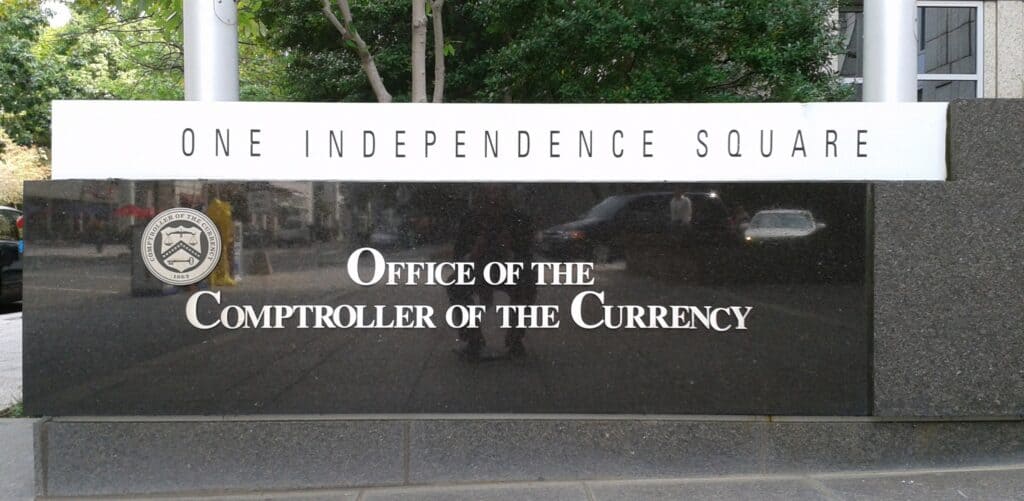A bad idea that could have upended key tenets of the banking system has died, in a victory for economic justice advocates, including the National Community Reinvestment Coalition (NCRC) and our members.
Figure Bank has withdrawn its application for a national banking charter, the Office of the Comptroller of the Currency (OCC) revealed last week in a notice on its corporate applications portal. It marked a quiet ending to what could have been a dangerous and significant event in banking history. If Figure’s application to become an uninsured nationally-chartered bank had been granted, it would have upended legal precedent – and created a blueprint for evading community reinvestment responsibilities.
The Community Reinvestment Act (CRA) requires banks to meet people’s banking needs in the places where they take insured deposits. A bank that does not have deposit insurance therefore has no CRA obligations to the marginalized. Figure understood that difference and made that clear when it wrote in its application that “Figure Bank will not be subject to CRA requirements and evaluation.”
Had Figure been allowed to charter an uninsured bank and begin making money from the privilege of a charter without spending any back into low- and moderate-income communities as our banking laws intend, lots of other companies and individuals would have flocked to the OCC application portal looking for the same permission slip. Figure’s decision to withdraw therefore closes a chapter on a threat to the economic justice mission embodied in the CRA.
But Figure’s failure to secure a charter has much broader positive implications, too – and these take a bit more unpacking.
Many people saw the application as a manifestation of past intentions to create a special charter format for fintechs. Under Comptroller Thomas Curry, the OCC surfaced the idea of a “special-purpose national bank charter” in 2016 and announced that it would begin accepting them in July 2018. After it stalled, Acting Comptroller Brian Brooks gave it new life by proposing a banking charter for payments companies and a trust charter for crypto firms.
These “novel charters” articulated a new definition of what it means to be a bank. Historically, banking was defined by three things: taking deposits, making loans, and facilitating payments. To be a bank, an entity had to do all three. The fintech charter envisioned a new landscape where a firm could do the last one and skip the other two.
Figure’s application was a test case for novel charters. NCRC led dozens of advocacy organizations in recommending that that test get an F-minus. Our letter offered several simple arguments, not least of which was that Congress has not changed the laws that the ‘novel charter’ notion violates.
The OCC has previously laid out a shaky vision for how to square this circle, dubbed the “Financial Inclusion Plan” (FIP), which was intended to mimic the spirit of CRA rules within the proposed “novel charter,” upending more than a century of banking law.
The FIP was weak sauce. It allowed applicants to do as little or as much as they wanted. If they wanted to skip making loans, that was ok. While the novel-charter applicants were expected to whiteboard possible ways to help underserved consumers, the OCC said it would approve the FIP after the charter application was approved. That would have severed the links between being a bank and meeting the needs of the community: Become a bank first, and promise you’ll figure out the rest later. The scope of a FIP could amount to as little as publishing a financial literacy curriculum.
At the surface level, Figure’s FIP contained some attractive ideas. But looking under the hood, it outlined a plan without commitment or accountability. Their FIP included a fee-free debit card to serve low-wealth and credit-invisible consumers. It contemplated investments in community development institutions. Most interestingly, Figure said it would donate a small portion of its profits to create the Figure Banking Technology Institution (FBTI). FBTI would have trained high school graduates to work in banking. Figure said its website would have plenty of advice on how to make a budget.
But the language was vague. The plan lacked real metrics for performance evaluation. And the bank said its proposed bank staff training school would be funded with five percent of profits.
CRA obligations apply regardless of a bank’s profitability. Many banks lose money, especially new ones. It’s the privilege of a charter – not successful operation at a profit – that compels a bank to take on responsibility to the public. Would Figure’s proposed bank employee training school have operated sporadically, closing in some years and working through dramatic swings to its budget with fluctuations in bank profitably?
Advocates found alignment with banking trade associations and state regulators in pushing back against the application. NCRC and the American Bankers’ Association published a joint op-ed in the American Banker, calling on the OCC to reject the application. The Conference of State Banking Supervisors filed a lawsuit. When the OCC appealed a New York decision to reject the special-purpose national bank charter (a follow-up version of the fintech charter), amicus letters were filed by trades and advocates.
In 2021, after state-level regulators pointed out in a lawsuit that the idea was likely illegal, Figure updated its application, offering to insure deposits. But the application never found traction. Figure’s intention to use blockchain throughout its operating model may have made the OCC skittish. Perhaps it never found a better solution for community reinvestment. It’s hard to know because application decisions are made behind closed doors.
Whatever was said in those closed-door discussions, the takeaway is the same. It had already been widely understood that Figure’s application was no longer a realistic possibility. But now the industry and advocates alike know that OCC leadership has moved on – and the foolhardy notion of the “novel charter” is dead.
Adam Rust is NCRC’s Senior Policy Advisor.
Photo via WikiMedia Commons.



